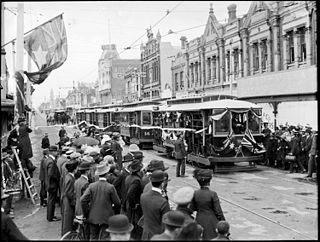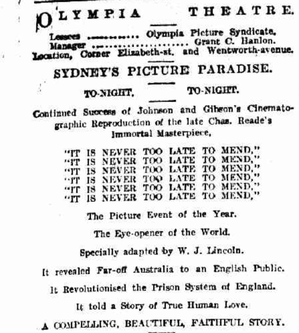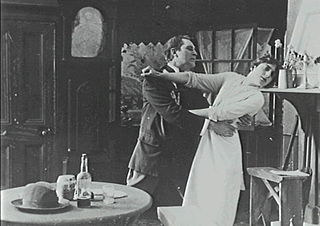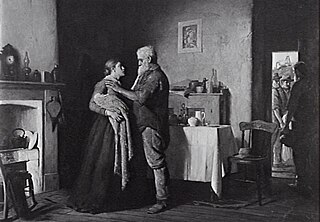Related Research Articles

William Joseph Lincoln was an Australian playwright, theatre manager, film director and screenwriter in the silent era. He produced, directed and/or wrote 23 films between 1911 and 1916.

Godfrey Cass was an Australian actor in the silent era. Between 1906 and 1935 he acted in nineteen film roles. He played Ned Kelly three times, and also had roles in a number of other bushranger movies including A Tale of the Australian Bush (1911) and Moondyne (1913).

The Prahran and Malvern Tramways Trust (PMTT) was a former tram operator in Melbourne, Australia. The trust was formed in 1907, with its first line operating in 1910. Its functions were taken over by the Melbourne & Metropolitan Tramways Board in 1920.

St James the Great, St Kilda East, is an Anglican parish church in the Melbourne suburb of City of Glen Eira in Victoria, Australia.

Edmund Duggan was an Irish-born actor and playwright who worked in Australia. He is best known for writing a number of plays with Bert Bailey including The Squatter's Daughter (1907) and On Our Selection (1912). His solo career was less successful than Bailey's. His sister Eugenie was known as "The Queen of Melodrama" and married noted theatre producer William Anderson, for whom Duggan frequently worked as an actor, writer and stage manager.

It Is Never Too Late to Mend is a 1911 Australian feature-length silent film written and directed by W. J. Lincoln.
Rip Van Winkle is a 1912 Australian feature-length film directed by W. J. Lincoln about Rip Van Winkle. It was arguably Australia's first fantasy film.
The Crisis is an Australian melodrama film directed by W. J. Lincoln. It was inspired by a painting, The Crisis by Frank Dicksee, and is considered a lost film.

Transported is an Australian convict melodrama film directed by W. J. Lincoln.
The Road to Ruin is an Australian melodrama film directed by W. J. Lincoln. It was one of the first movies from Lincoln-Cass Films and is considered a lost film.
The Reprieve is a 1913 Australian melodrama film directed by W. J. Lincoln about a man on trial for killing his unfaithful wife. It is considered a lost film. Contemporary reviews were positive.
Lincoln Cass Films was a short-lived Australian film production company.
The Sick Stockrider is a 1913 film directed by W. J. Lincoln based on the 1870 poem of the same title by Adam Lindsay Gordon. It was the first production from Lincoln-Cass Films and is one of the few Australian silent films to survive in its entirety.

Breaking the News is a 1912 Australian melodrama film directed by W. J. Lincoln based on John Longstaff's 1887 painting of the same name.

The Double Event is a 1911 Australian feature-length film directed by W. J. Lincoln based on the first novel by Nat Gould, which had been adapted several times for the stage, notably by Bland Holt.
Called Back is a 1911 Australian feature-length film directed by W. J. Lincoln based on a popular play which was adapted from an 1883 novel by Hugh Conway. Although the movie was a popular success it is now considered a lost film.

Captain Midnight, the Bush King is a 1911 Australian silent Western film about the fictitious bushranger Captain Midnight. It was the directorial debut of actor Alfred Rolfe. The film is based on the play of same name by W. J. Lincoln and Alfred Dampier. Captain Midnight, the Bush King is now considered lost.
After Sundown is a 1911 Australian film directed by W. J. Lincoln set in the Australian bush.
Wilton Welch was an Australian comic actor and dramatist, husband and collaborator of Louise Carbasse, best known as Louise Lovely.

Moondyne is a 1913 Australian film from the Lincoln-Cass Film Company based on the novel Moondyne. It was the second film from Lincoln Cass.
References
- ↑ Mary Bateman, 'Lincoln Cass Filmography', Cinema Papers, June–July 1980 p 175
- ↑ "Advertising". The Herald. No. 11, 812. Victoria, Australia. 13 September 1913. p. 6. Retrieved 19 July 2024– via National Library of Australia.
- ↑ "MOVING PICTURES". The Prahran Telegraph (Vic. : 1889 – 1930) . Vic. 13 September 1913. p. 6. Retrieved 7 July 2015– via National Library of Australia.
- ↑ "THE PICTURE WORLD (Contd.). Who's Who in the Movies". Table Talk. No. 3116. Victoria, Australia. 26 January 1928. p. 28. Retrieved 19 July 2024– via National Library of Australia.
- ↑ "Lincoln-Cass Films Co". The Prahran Telegraph . Vol. 51, no. 2707. Victoria, Australia. 6 September 1913. p. 5. Retrieved 19 July 2024– via National Library of Australia.
- ↑ Andrew Pike and Ross Cooper, Australian Film 1900–1977: A Guide to Feature Film Production, Melbourne: Oxford University Press, 1998, p43
- ↑ "HOYT'S PICTURE THEATRE". The Argus . Melbourne. 4 September 1913. p. 10. Retrieved 28 January 2012– via National Library of Australia.
- ↑ "AMUSEMENTS". The Barrier Miner . Broken Hill, NSW. 4 November 1913. p. 3. Retrieved 28 January 2012– via National Library of Australia.
- ↑ "LYRIC THEATRE". The Prahran Telegraph (Vic. : 1889 – 1930) . Vic. 20 September 1913. p. 6. Retrieved 7 July 2015– via National Library of Australia.